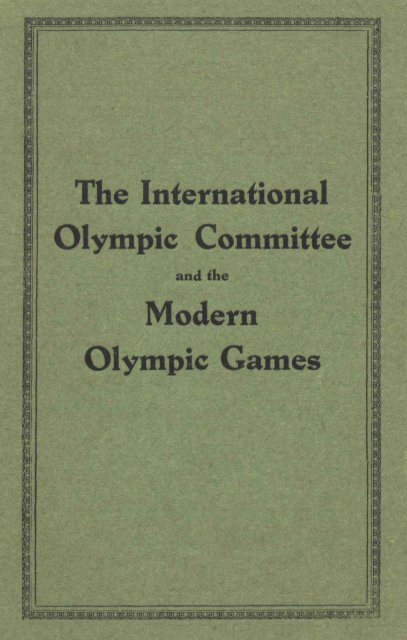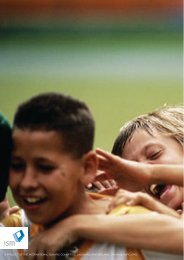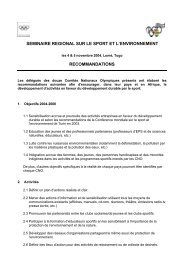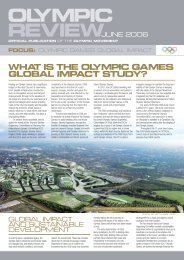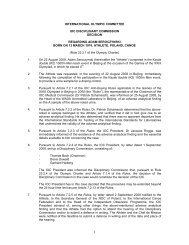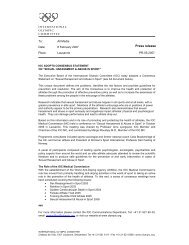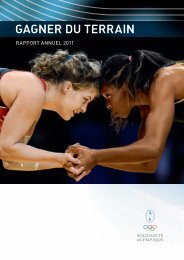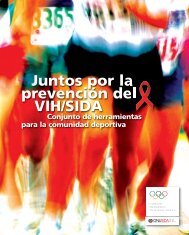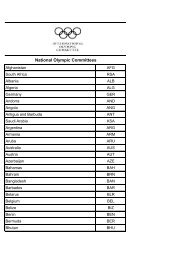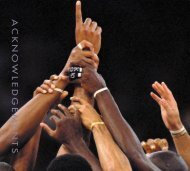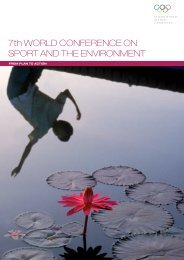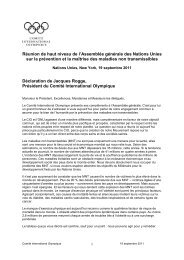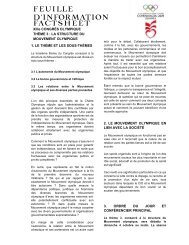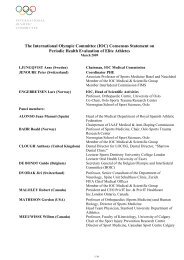Olympic Charter 1933 - International Olympic Committee
Olympic Charter 1933 - International Olympic Committee
Olympic Charter 1933 - International Olympic Committee
Create successful ePaper yourself
Turn your PDF publications into a flip-book with our unique Google optimized e-Paper software.
s^ss^smmm^^m^s^smtd<br />
The Iniertiational<br />
<strong>Olympic</strong> Commiiiee<br />
and the<br />
Modern<br />
<strong>Olympic</strong> Games<br />
FMmmSJS^MsMMmWUEMjlSMM^lMMJlK^P
1<br />
i<br />
!<br />
Are you a Sportsman ?<br />
As a player.<br />
THINK :<br />
1. — Do you play the Game for the Game's sake ?<br />
2. — Do you play for your team and not for yourself?<br />
3. — Do you carry out your captain's . orders without<br />
question criticism ?<br />
4. — Do you accept the umpire's decision absolutely ?<br />
5. — Do you win without swank an d lose without<br />
grousing ?<br />
6. •— Would you rather lose than do anything which<br />
you are not sure is fair ?<br />
1.<br />
2.<br />
3.<br />
4.<br />
Then you are in the way to become<br />
As a Speciaior.<br />
a sportsman.<br />
— Do you refuse to cheer good play by your<br />
opponents ?<br />
— Do you boo the umpire when he gives a decision<br />
you don't like ?<br />
— Do you want to see your side win if it does<br />
not deserve to ?<br />
— Do you quarrel with spectators for backing the<br />
other side ?<br />
Then you are no sportsman. Try to become one.
••rt\:Yt'Yt\Vii
1902 Comte de Mejorada del Campo<br />
1903 Comte Cesar de Wartenslobem<br />
1903 Comte da Baillet-Latour<br />
1903 James Hyde<br />
1903 Carlos F. de Candamo<br />
1904 Comte Albert Bertier de Sauvigny<br />
1905 General Comte von der Asseburg<br />
1905 R. Coombes<br />
1905 Prince Alexandre de Solms Braunfels<br />
1905 Capitaine Heinrik Angell<br />
1906 E. N. Tzokow<br />
1906 Capitaine Grut<br />
1906 Lord Desborougb of Taplow<br />
1906 Professeur de Lanoaatre<br />
1907 Manuel Quintana<br />
1907 Comte Geza Andrassy<br />
1907 Th. Heftye<br />
1908 Allison Armour<br />
1908 Baron R. de Willebrand<br />
1908 Prince Scipion Borghese<br />
1908 Comte Gautier Vignal<br />
1908 Commandant Sverre<br />
1908 Georges A. Plagino<br />
1908 Prince Simon Troubetzkoi<br />
1908 Selim Sirry Bey<br />
1909 Baron de Wennitigen<br />
1909 Sir Theodore Cook<br />
1909 Senateur JuJes de Muzsa<br />
1909 Conseiller Attilio Bruniaiti<br />
1909 Professeur Jigoro Kano, Senateur<br />
1910 Comte A. Sierstorpff<br />
1910 Angelo C. Bolanachi<br />
1910 Maurice Pescatore<br />
1 9 1 Oi Prinoe Leon Ouroussoff<br />
1911 S. A. le Prince Othon d«<br />
Windischgraetz<br />
1911 Sir John Hanbury William.<br />
1911 Evert Wendell<br />
1911 A. Ballif<br />
1912 Comte R. de Colloredo Mansfeld<br />
1912 Professeur O. N. Garcia<br />
1912 Mlarquis de Villamejor<br />
1912 Comte de Penha Garcia<br />
1912 General S. W. Djoukitch<br />
1913 Comte Arnim Muskau<br />
1913 S. E. de Rio Branco<br />
1913 S. E. D. Stancioff<br />
1913 Sydney Farrar<br />
1913 Colonel Hansen<br />
1913 A. Glandaz<br />
1913 Due de Somerset<br />
1913 General Carlo Montu<br />
1911 Spain<br />
1913 Germany<br />
Belgium<br />
1 908 United States<br />
1922 Peru<br />
1920 France<br />
1909 Germany<br />
1932 Australia<br />
1909 Austria<br />
1907 Norway<br />
1912 Bulgaria<br />
1912 Denmark<br />
1909 Great Britain ' '<br />
1912 Portugal<br />
1910 Argentine<br />
Hungary<br />
1903 Norway<br />
1919 United States<br />
1920 Finland<br />
1909 Italy<br />
Monaco<br />
1927 Norway<br />
Roumeuiia<br />
1910 Russia<br />
1930 Turkey<br />
1914 Germany<br />
1915 Great Britain<br />
Hungary ...<br />
1913 Italy<br />
Japan<br />
1919 Germany<br />
Egypt<br />
(Greece <strong>1933</strong>)<br />
I 929 Luxemburg<br />
<strong>1933</strong> Russia<br />
1919 Austria<br />
1921 Canada<br />
1921 United Sutes<br />
1913 France<br />
1919 Austria<br />
1919 ChUi<br />
1921 Spain<br />
Portugal<br />
Yougoslavia<br />
(Serbia)<br />
1919 Germany<br />
Brazil<br />
1929 Bulgaria<br />
1919 Cuba<br />
1922 Denmark<br />
France<br />
1920 Great Britain<br />
Italy
1913 Georges Duperron<br />
1914 Marquis de Polignac<br />
1918 P. J. de Matheu<br />
1919 Baron de Laveleye<br />
1920 Carloa Siiva Vildosola<br />
1920 Dorn y de Alsua<br />
1920 Judg.e. Bartow Weeks<br />
1920 Ernst Krogius<br />
1920 Comte Clary<br />
1920 Brigadier Genera] R. J. Kentish<br />
1920 Sir Dorabii J. Tata<br />
1920 Marquis Guglielmi<br />
1920 Arthur Marryatt<br />
1920 Henry Nourse<br />
1920 Professeur Dr. Fr. Bucar<br />
1921 J. G. Merrick<br />
1921 H. Echevarrieta<br />
1921 Niizam Eddin KJioi<br />
1921 J. S. Edstrom<br />
1921 Dr. F. Ghigliani<br />
1922 S. E. de Alvear<br />
1922 S. El. ie Dr. C. T. Wang<br />
1922 Ivar Nyholm<br />
1922 Baron de Guell<br />
1922 William May Garland<br />
1922 S. E. General Ch. H. Sherrill<br />
1922 The Earl Cadogan<br />
1922 J. J. Keane<br />
1922 Prince Casimir Lubomirski<br />
1923 R. C. Aldao<br />
1923 Arnaldo Guinle<br />
1923 Dr. Ferreira Santos<br />
1923 S. E. J. Matte Gormaz<br />
1923 Porfirio Franca<br />
1923 Mbrquis de Guadalupe<br />
1923 S. E. Alfredo Benavides<br />
1924 S. E. le Secretaire d'Etat Th. LewaW<br />
1924 Dr. Oskar Ruperti<br />
1924 James Taylor<br />
1924 Dr. Martin Haudek<br />
1924 Due d'Albe<br />
1924 Dr. S. Kishi<br />
1924 Lt. Colonel Scharroo<br />
1924 Jorge Gomez de Parada<br />
1924 S. A. le Prince Samad Kihan<br />
1925 President David Kinley<br />
1925 Baron A. Schimmelpenninck<br />
van der Oye<br />
1925 Comte Alberto Bonacoasa<br />
1925 J. P. Firth<br />
1926 S. A. S. le Due Adolphe Frederic<br />
de Mecklenburg-Schwerin<br />
1926 G Averoff<br />
1926 J. Dikmani.<br />
1915 Russia<br />
France<br />
Central America<br />
Belgium<br />
1922 Chili<br />
1929 Equator<br />
1921 United States<br />
Finland<br />
<strong>1933</strong> France<br />
<strong>1933</strong> Great Britain<br />
1930 India<br />
1930 Italy<br />
1925 New Zealand<br />
South Africa<br />
Yougoslavia<br />
Canada<br />
1923 Spain<br />
1923 Persia<br />
Sweden<br />
Uruguay<br />
1932 Argentine<br />
China<br />
1931 Denmark<br />
Spain<br />
United States<br />
United States<br />
1929 Great Britain<br />
Ireland<br />
1930 Poland<br />
Argentine<br />
Brazil<br />
Brazil<br />
1928 Chili<br />
Cuba<br />
1924 Mexico<br />
Peru<br />
Geranany<br />
1929 Germany<br />
Australia<br />
1928 Austria<br />
1927 Spain<br />
Holland<br />
Japan<br />
192 7 Mexico<br />
1927 Persia<br />
1927 United States<br />
Holland<br />
Italy<br />
1927 New Zealand<br />
Germany<br />
1930 Greece<br />
Lat%Ma
1927<br />
1927<br />
192 7<br />
1927<br />
192 7<br />
1928<br />
1928<br />
1928<br />
1928<br />
1928<br />
1929<br />
1929<br />
1929<br />
1929<br />
1930<br />
1930<br />
1930<br />
1931<br />
1931<br />
1931<br />
1932<br />
1932<br />
1932<br />
1932<br />
<strong>1933</strong><br />
<strong>1933</strong><br />
<strong>1933</strong><br />
<strong>1933</strong><br />
<strong>1933</strong><br />
Marquis de Pons<br />
Hon. Ernest Lee Jahncke<br />
Lord Rochdale<br />
Dr. M. Saenz<br />
Th. Fearnley . '<br />
Dr. Theodore Schmidt<br />
Sir George McLaren Brown<br />
S. E. Dr. F. Akel<br />
Lt. Colonel B. Freyfcerg<br />
S E. lignace Matuszeivaki<br />
Dr. Karl Ritter von Halt<br />
S. E. Stepihan G. Tchapraohikov<br />
Don Alfredo Ewing<br />
Lord Aberdare<br />
S. E. M. Politis<br />
S. E. Augusto Turati<br />
S. E. Kemalettin Sami PacKa<br />
Comte de Vallellano<br />
C. J. Wray<br />
General Dr. Rouppert<br />
Horacio Bustos Moron Jr.<br />
S. A. R. le Prince Axel de Danemark<br />
G. D. Sondhi<br />
Comte Paolo Thaon de Revel<br />
Sir Harold Laxton<br />
Lord Burghl'ey<br />
Sir Noel Curtis Bennett<br />
Dr. Jotaro Sugimoura<br />
Rechid Saffet Bey<br />
*<br />
1930<br />
<strong>1933</strong><br />
1932<br />
1932<br />
1930<br />
<strong>1933</strong><br />
<strong>1933</strong><br />
1931<br />
<strong>1933</strong><br />
^<br />
Spain<br />
United States<br />
Great Britain<br />
Mexico<br />
Norway<br />
Austria<br />
Canada<br />
Esthonia<br />
New Zealand<br />
Poland<br />
Germany<br />
Bulgaria<br />
Chili<br />
Great Britain<br />
Greece<br />
Italy<br />
Turkey<br />
Spain<br />
New Zealand<br />
Argentine^<br />
Poland J<br />
Denmark<br />
India<br />
Italy<br />
Australia<br />
Great Britain<br />
Great Britain<br />
Japan<br />
Turkey<br />
National <strong>Olympic</strong> Commiiiees<br />
Afghanistan, Argentine, Australia, Austria, Belgium, Bolivia,<br />
Brazil, Bulgaria, Canada, Central America, Chili, China,<br />
Colombia, Cuba, Danemark, Egypt, Esthonia, Finland, France,<br />
Germany, Great Britain, Greece, Guatemala, Haiti, Holland,<br />
Hugary, India, Indo-China, Ireland, Italy, Japan, Lettonia,<br />
Luxemburg, Mexico, Monaco, Nicaragua, Norway,<br />
New Zealand, Palestine, Paraguay, Peru, Philippines, Pol?ind,<br />
Portugal, Roumania, Spain, Sweden, Switzerland, San<br />
Salvador, South Africa, Czecho-Slovakia, United States of<br />
America, Uruguay, Venezuela, Yougo Slavia.
Sporiing Iniernaiional Federaiions<br />
Amateur Athletic, Boxing Amateur, Bobsleigh and Tobogganing,<br />
Cycling, Fencing, Football Association, Gymnastics,<br />
Equestrian, Handball Amateur, Hockey on Turf,<br />
Hockey on Ice, Wrestling Amateur, Rowing, Swimming<br />
Amateur, Skating Union, Pelote Basque, Weight Lifting,<br />
Ski, Shooting, Yacht Racing Union, Modern Pentathlon.<br />
Celebration of ihe Olympiades<br />
I lere Olympiade 1896 Athens<br />
Heme Olympiade 1900 Paris<br />
Illeme Olympiade 1904 St. Louis<br />
IVeme Olympiade 1908 London<br />
Veme Olympiade 1912 Stockholm<br />
VIeme Olympiade 1916 X<br />
Vlleme Olympiade 1920 Antwerp<br />
Vllleme Olympiadio 1924 Paris<br />
IXeme Olympiade 1928 Amsterdam<br />
Xeme Olympiade 1932 Los Angeles<br />
Xlemet Olympiade 1936 Berlin<br />
<strong>Olympic</strong> Winter Games<br />
1st. Ol. Winter G. 1924 Chamonix<br />
llnd. 1928 St. Moritz<br />
lUrd. 1932 Lake Placid<br />
IVth. 1936 Carmisch Partenkirdien<br />
Games under ihe High Patronage<br />
of the I. O. C.<br />
Far Eastern Games (I to X China Japan Manila)<br />
Oames of Latin America (Rio de Janeiro 1922)<br />
•Games of Central America (Mexico 1926, Havana 1930)<br />
Balkanic Games (Sofia 1931)
OLYMPIC CONGRESS<br />
Pari* 1894 Restoration of <strong>Olympic</strong> Gamea<br />
Le Havre 1897 Sporting Hygienism and Pedagogyi-<br />
Brussels 1905 Technics of Sporting Exercice<br />
Paris 1906 Arts, Letters and Sports<br />
Lausanne 1913 Sporting Psyoology<br />
Paris 1914 <strong>Olympic</strong> Rules and Regulations<br />
Lausanne 1921 id.<br />
Prague 1925 id.<br />
Berlin 1930 id.<br />
Holders of the Cup<br />
created by the Baron P. de Couberiint<br />
1906 J'ouring Clulb de France<br />
1907 Henley RoyaJ Regatta<br />
1908 Severiges Centnalforening for Idrottens Framjande<br />
1 909 Deutsche Turnersohaft<br />
1910 Ceska obeci Sokolska<br />
1911 Touring Club Italiano<br />
1912 Union des Societes de Gytnnastique de France<br />
1913 Magyar athletikai Qub _<br />
1914 Amateur Atihletic Union of America<br />
1915 Rugby School England<br />
1916 Cortfreriie St. Michel de Gand<br />
1917 Nederlandsche Voetbal Club<br />
1918 Effuipes Sportives du Front Allie<br />
1919 Institut Olympique de Lausanne<br />
1920 Y. M. C. A. Intrenational College Springfield<br />
192 I Dansk Idraets Forbund<br />
1922 Amateur Athletic Union of Canada'<br />
1923 Asociacion Sportiva de Cataluna<br />
1924 Federation Gymnique et Athletique Finlandaise<br />
1925 Comite National d'iE
«f.r«t./-*\:ri\t/iiir/ui:A^r(8^<br />
The<br />
Iniernaiional <strong>Olympic</strong> Commiiicc<br />
Object.<br />
Organisation.<br />
The <strong>International</strong> <strong>Olympic</strong> <strong>Committee</strong>, which was reestablished<br />
in Paris in 1894 by Baron Pierre de Coubertin,<br />
proposed to ensure after 1896 the regular celebration of the<br />
Modern <strong>Olympic</strong> Games and to take all proper steps to conduct<br />
modern athletics in the right way, by fostering the spirit<br />
of chivalry, love of «fair plays>, reverence for true amateurism<br />
and by getting the help of the official authorities.<br />
It is their task to organise Physical Education, to open<br />
playing fields where every citizen can train himself or practise<br />
any kind of that physical culture which is so essential<br />
at all times for the health of every man or woman.<br />
The moral virtue attached to sport had hitherto been<br />
neglected. The revivor of the <strong>Olympic</strong> Games, as well as.<br />
his first collaborators were convinced that this power could<br />
be utilised if all sports were conducted on an equal footing<br />
and under conditions as perfect as possible. They thought<br />
quite rightly that those gatherings of young men were one<br />
of the best ways to make the different classes in a country<br />
as well as the units of different civilizations well acquainted<br />
with each other and to promote better understanding. Those<br />
who followed did their utmost to improve that wonderful<br />
manifestation, which is the sporting criterion of the races<br />
of the world, and contributed worthily to bring together<br />
those who have taken part in the Games.<br />
A tablet to commemorate the revival of the <strong>Olympic</strong> Games<br />
has been erected by the Hellenic Government. Unveiled on
the 17th of April, 1927, (IVth. year of the VIII Olympiad)<br />
it is located in the old sacred wood at Olympia, between<br />
the Museum and the duins of Altis. It has been carved out<br />
of a large square piece of white marble, decorated with a<br />
medallion representing Jupiter's profile by Phidias and bearing<br />
a Greek and French inscription honouring the initiative<br />
of the re-creator of the Games, inspiring the proclamation<br />
made in Paris the 23rd of June, 1894, when those Games<br />
were re-established on a new foundation in accordance with<br />
modern conditions, and also the celebration of the 1st Olympiad<br />
in the Stadium of Athens by all the nations in 1896.<br />
On the same day Pierre de Coubertin delivered the following<br />
message to the «Sports» youth of the world: «Today,<br />
amongst the famous ruins of Olympia, the monument<br />
erected to commemorate the revival of the <strong>Olympic</strong> Games<br />
thirty-three years ago has been unveiled. The enterprise<br />
which the Hellenic Government has honoured has taken itsplace<br />
in history. It is up to you to maintain it. My friends<br />
.and I have not fought and worked to restore the <strong>Olympic</strong><br />
Games to you as an object for museum or cinema, nor is<br />
it our wish that mercantile or electoral intereste should seize<br />
upon them. In reviving this institution, twenty-five centuries<br />
old, we have wished you to become devotes of the religion<br />
of Sport in the same sense asi it was conceived by your<br />
famous ancestors. In the present world, where posibilities<br />
are great, and yet threatened by so many risks of degeneration,<br />
Olympism may be a school of moral nobility and purity,<br />
•as well as of'^ physical endurance and energy, provided that<br />
you always keep your conception of honour and disinterestedness<br />
in sport on a level with your physical powers.<br />
The future rests with you.»<br />
The <strong>International</strong> <strong>Olympic</strong> <strong>Committee</strong> is permanent and<br />
•self-elected, having at least one member or at the most three<br />
members from each country represented. These members<br />
elected for an indefinite period, are not bound to be citizens<br />
•of the country they represent but needless to say before<br />
every election great care is taken to make sure that these<br />
who are likely ot be elected are well qualified. The members<br />
^re expected to consider themselves as delegates of the<br />
<strong>International</strong> <strong>Olympic</strong> <strong>Committee</strong> to the Federations and<br />
Sports Associations of their respective countries. They must<br />
not accept from these Associations any mandate which will<br />
in any way bind them as members of the <strong>Committee</strong> or<br />
10
interfere with the independence of their vote. Their first<br />
duty is to make sure that the fundamental principles of the<br />
<strong>Charter</strong>, which is unalterable, are observed by all concerned.<br />
At the present time the <strong>International</strong> <strong>Olympic</strong> <strong>Committee</strong><br />
is represented in 43 countries by 66 delegates.<br />
The <strong>International</strong> <strong>Olympic</strong> <strong>Committee</strong> itself fixes the place<br />
and dates of meetings according to needs and circumstances.<br />
The <strong>Committee</strong> chooses its own President, who is elected<br />
for eight years and is eligible for re-election. The President<br />
represents the <strong>Committee</strong> and governs with the Executive<br />
<strong>Committee</strong> which is composed of 6 members elected for four<br />
years likewise eligible for re-election, and the Council of<br />
the Delegates of those <strong>International</strong> Federations, whose<br />
Sports compose the Programme of the Games. This Council,<br />
composed of one Delegate of each <strong>International</strong> Federation<br />
is the Technical <strong>Committee</strong>. Those two <strong>Committee</strong>s meet<br />
when summoned by the President of the <strong>International</strong><br />
<strong>Olympic</strong> <strong>Committee</strong>.<br />
The duties of the <strong>International</strong> <strong>Olympic</strong> <strong>Committee</strong> are<br />
to draw up the Rules of the Games and the General Programme,<br />
decide the qualifications of the amateur athletes<br />
chosen to take part, settle the place where each Olympiad<br />
shall be celebrated, convene the <strong>Olympic</strong> Congresses, at<br />
which are represented the National <strong>Olympic</strong> <strong>Committee</strong>s and<br />
the <strong>International</strong> Federations, and agree the agenda. The<br />
Executive <strong>Committee</strong> constitutes the Jury of Honour during<br />
the games.<br />
The flag of the <strong>International</strong> <strong>Olympic</strong> <strong>Committee</strong> is:<br />
Five rings (blue, yellow, black, green and red, being the<br />
six colours which may be found in the flags of the different<br />
nations) on a white ground.<br />
The motto is : Citius, Altius, Fortius.<br />
The official language is French.<br />
The official headquarters and the secretariat are at «Mon<br />
Repos», Lausanne, Switzerland.<br />
In every country where they are appointed, the members<br />
of the <strong>International</strong> <strong>Olympic</strong> <strong>Committee</strong> must at once constitute<br />
a National <strong>Olympic</strong> <strong>Committee</strong> by agreement with<br />
the Federations and Sporting Associations of the country,<br />
because without such <strong>Committee</strong> the country could not<br />
take part in <strong>Olympic</strong> Games, the National <strong>Olympic</strong> <strong>Committee</strong><br />
being the only authority competent to receive and<br />
m
{orward the entries, sent to them by the National Associations,<br />
after they have signed the declaration that each competitor<br />
is an amateur according to both his Association's and<br />
the <strong>Olympic</strong> definition of an amateur.<br />
The National <strong>Olympic</strong> <strong>Committee</strong>s, to fulfil their duty,<br />
must avoid any political or other influence and when called<br />
upon to take a decision be actuated only by general interest<br />
without taking into consideration local questions or the<br />
desire to favour national competitors.<br />
The National Federations must be represented on those<br />
<strong>Committee</strong>s but it is also essential to associate all those<br />
who may be helpful to sport and even in certain countries<br />
representatives of the Minister's offices, which have the<br />
management of sport in their province. The National <strong>Olympic</strong><br />
<strong>Committee</strong>s are very important bodies because it is their<br />
duty if there are any disputes to find a solution and to<br />
maintain real amateurism. They must also put into force the<br />
decisions pronounced by the Jury of Honour, organize every<br />
four years their Country's teams as far as housing and<br />
transport are concerned, and be responsible for the whole<br />
organization of te Games, when these are held in their own<br />
country.<br />
The <strong>International</strong> <strong>Olympic</strong> <strong>Committee</strong>, to whora the<br />
Congress of the Sorbonne in 1894 entrusted the miss on of<br />
watching over the development of the <strong>Olympic</strong> G ames,<br />
assumed the technical conduct of the Games of Athens<br />
(1896), Paris (1900), St. Louis (1904), London (1908),<br />
Stockholm (1912) and Antwerp (1920), with the help of<br />
the <strong>International</strong> Federations. During the same period <strong>Olympic</strong><br />
Congresses were held at Harve (1897), Brussels (1?05),<br />
Paris (1906) and Lausanne (1913), to discuss Sporting<br />
Pedagogy, Sporting Psychology, Hygiene, Technics of<br />
Physical Exercice and Art Competitions. In 1921 the <strong>International</strong><br />
<strong>Committee</strong> spontaneously gave up the technical<br />
conduct of the Games, wich was left entirely to the <strong>International</strong><br />
Federations, by whome the Technical Regulations.<br />
had been used since the early days. The <strong>Olympic</strong> Rules<br />
that are to be found on the agenda of the Paris Conr^rcss<br />
in 1914 were settled once and for all at Lausanne (1921),<br />
Prague (1925) and Berlin (1930). Henceforth in conformity<br />
with that decision of the I.O.C., the <strong>International</strong> Federations<br />
decide the number of events for each sport in agreement<br />
with the Executive <strong>Committee</strong> of the <strong>International</strong><br />
I?
<strong>Olympic</strong> <strong>Committee</strong> and fix, each in their own sport, the<br />
number of entrants for each event, keeping within the hmits<br />
of the General Rules. They have charge of all sporting<br />
•equipment and technical control of the events. They choose<br />
the Ground Judges and the Judges of Appeal. They deal<br />
finally with all protests.<br />
The <strong>Olympic</strong> Games must take place during the first<br />
year of the Olympiad which they are to celebrate. Under<br />
no pretext whatsoever can they be adjourned to another<br />
year. The period of the Games shall not exceed 16 days.<br />
The events must all take place in the town selected, either<br />
•at the Stadium or in its neighbourhood. All the different<br />
branches of sport are placed on the same footing and none<br />
is favoured above another. No special embassy can be accepted<br />
on the occasion of the Games, the members of the<br />
<strong>International</strong> <strong>Committee</strong>, the members of the Organizing.<br />
<strong>Committee</strong>, The Presidents of the National <strong>Olympic</strong> <strong>Committee</strong>s<br />
and the Presidents of the <strong>International</strong> Federations<br />
form the <strong>Olympic</strong> Senate.<br />
There is a distinct cycle of <strong>Olympic</strong> Winter Games, which<br />
are held in the same year as the other Games, for which<br />
the first refusal is given to the country holding the current<br />
<strong>Olympic</strong> Games on condition that it can give sufficient<br />
^arantees to organise the full programme of the Winter<br />
-Games.<br />
Generally speaking, only those who are native of a<br />
country or naturalised subjects of that country, or of a<br />
state which is part of that country, are qualified to compete<br />
in <strong>Olympic</strong> Games under the colours of that country. Those<br />
who have already competed in the <strong>Olympic</strong> Games cannot<br />
compete in future <strong>Olympic</strong> Games for another nation even<br />
if they have become naturalised subjects of that nation,<br />
except in the case of conquest or the creation of a new<br />
state ratified by treaty. Every competitor must be an amateur<br />
according to the definition of the <strong>International</strong> Federation<br />
of his sport and must satisfy the following conditions :<br />
1. Must not be, or knowingly have become, a professional<br />
in the Sport for which he is entered or in any other sport;<br />
2. Must not have received re-imbursement or compensation<br />
for loss of salary ;<br />
3. Must sign the following declaration on his honour :<br />
«I, the undersigned, declare on my honour that I am an<br />
-Amate;ur according to the <strong>Olympic</strong> Rules of Amateurism*.<br />
IS
There is no age limit for competitors. Women are not<br />
excluded but the <strong>International</strong> <strong>Olympic</strong> <strong>Committee</strong>, if requested<br />
by an <strong>International</strong> Federation, decides the events<br />
in which they may take part.<br />
The official Programme must comprise : Athletic Sports,<br />
Gymnastics, Defensive Sports, Aquatic Sports, Riding,<br />
Decathlon and Pentathlon, Art Competitions (Architecture,<br />
Literature, Music, Painting and Sculpture). The organizing<br />
<strong>Committee</strong> may organise demonstrations of two sports not<br />
included in the programme : A National Sport ; a sport<br />
foreign tot the Organizing Country. Therefore the sports<br />
and games admitted by the <strong>International</strong> <strong>Olympic</strong> <strong>Committee</strong><br />
are : Athletic Sports, Gymnastics, Boxing, Fencing, Wrestling,<br />
Shooting, Rowing, Swimming, Equestrian Sports,<br />
Cycling, Weight Lifting, Yachting and the following Athletic<br />
Games : Football (Association and Rugby) Lawn<br />
Tennis, Polo, Water-Polo, Hockey, Handball, Basketball<br />
and Pelota from which the Organizing <strong>Committee</strong> may select<br />
those which it can organize, provided that the finals<br />
are competed during the official period of the Games and<br />
that the relevant amateur definition falls within the principle<br />
of te I.O.C.<br />
The programme for the Winter Games includes the following<br />
events: Ski-ing, Skating, Ice Hockey, Bobsleigh and<br />
Tobogganning.<br />
The maximum number of entries for each nation in each<br />
event is fixed by the <strong>International</strong> Federation. However the<br />
following numbers cannot be (except in the Winter Games)<br />
exceeded :<br />
a) For individual events, three competitors from each<br />
nation, (without reserves).<br />
b) For team events, one team per nation, the number of<br />
the reserves to be fixed by the <strong>International</strong> Federatioa<br />
concerned.<br />
In the <strong>Olympic</strong> Games there is no classification according<br />
to points.<br />
A Roll of Honour is set up bearing the names of the<br />
first six competitors in each event.<br />
Since the Games of Amsterdam the names of the winners<br />
are engraved on the walls of the Stadium.<br />
Besides the prizes which consist of diplomas and <strong>Olympic</strong><br />
medals (silver and gilt, silver and bronze) three specTal<br />
14
prizes are meant to commemorate the finest performance<br />
accomplished during the four years of the Olympiad ia<br />
Aviation, Mountain Climbing or Hunting.<br />
The Baron P. de Coubertin also presented the «01ympic<br />
Cup» which is awarded every year and created the <strong>Olympic</strong><br />
Diploma which is given in very special-circumstances tt><br />
commemorate exceptional qualities of sportsmanship or for<br />
special services rendered.<br />
The «Challengecups» which had been presented for the<br />
first Games are no longer competed for and are kept in the<br />
<strong>Olympic</strong> Museum at Lausanne.<br />
The <strong>International</strong> <strong>Olympic</strong> <strong>Committee</strong> has also granted<br />
its patronage to Regional Games, which have been so helpful<br />
in the countries where they have taken place. First of all<br />
should be noted the Far Eastern Games, established in<br />
1913, in which China, Japan and the Philippines have met<br />
nine times. British India joined in recently and it is hoped<br />
that before long the Dutch Indies, Indo China and Siam<br />
will follow suit. The Latin American Games came next, unfortunately<br />
the general political situation prevented the repetition<br />
of the Games of Rio de Janeiro of 1922. Mexico and<br />
Havana were the seat of the Central American Gam;s in<br />
1926 and 1930. The African Games were due in Alexandria<br />
in 1929, but at the last minute were not held. It was a very<br />
great pity due to unfortunate influences, but all hope is not<br />
lost of having them before long in that wonderful stadium.<br />
Last on the hst are the Balkan Games organized for the<br />
first time in Sofia in 1931.<br />
To sum up, it might be said that the members of the<br />
<strong>International</strong> <strong>Olympic</strong> <strong>Committee</strong> are the link between the<br />
<strong>International</strong> <strong>Committee</strong> and the Nations, the National<br />
<strong>Olympic</strong> <strong>Committee</strong>s are the link between the <strong>International</strong><br />
<strong>Olympic</strong> <strong>Committee</strong> and the National Associations ; The<br />
Council of the Delegates of the <strong>International</strong> Federations<br />
is the link between the Internaional <strong>Olympic</strong> <strong>Committee</strong> and<br />
the <strong>International</strong> Federations. The good results which have<br />
been accomplished are due to the collaboration of tho:e<br />
three bodies and to the mutual respect for their respective<br />
privileges.<br />
The <strong>International</strong> <strong>Olympic</strong> <strong>Committee</strong> having very wisely<br />
left all technical matters in the hands of the <strong>International</strong><br />
Federations, has promoted a keener interest on their part<br />
and has itself more time free to make the Universities, the<br />
15^
Schools, the Colleges and the Officials realise the importance<br />
of physical education and more appreciative of the<br />
part that Sport may play in the organization of the world<br />
at large.<br />
The future anyhow is not free of danger ;. success is often<br />
the forerunner of misfortune. It fosters jealousy and in many<br />
cases leads to temptation, which it is not easy to resist,<br />
but, as long as the <strong>International</strong> <strong>Olympic</strong> <strong>Committee</strong> devotes<br />
its activity to impressing on the mind of the sporting<br />
youth the leading principles of the <strong>Committee</strong>'s eminent<br />
founder, sportsmen will retain the benefit of that wonderful<br />
quality so neatly expressed in the Latin proverb : Mens<br />
sana in corpore sano.<br />
All these who take an interest in <strong>Olympic</strong> affairs ought<br />
to read the «Memoircs of the Baron Pierre de Coubertin»,<br />
which constitutes the history of Olympism from 1894 to<br />
1925, and subscribe to the Official Bulletin of the I.O.C.<br />
That is the way to keep in touch with all decisions taken<br />
• and everything connected with <strong>Olympic</strong> Games.<br />
They should be applied for at the Secretariat of the<br />
I.O.C, «Mon Repos», Lausanne, Switzerland.<br />
)t«<br />
Lausanne, May, <strong>1933</strong>.
Loyalty is the highest quality for<br />
a sportsman.<br />
Self eontrole is the duty of every<br />
sportsman.<br />
W^ithout fair play there is no beauty<br />
in sport.<br />
Spirit of chivalry is the ennobling<br />
fcatur'e of sport.


